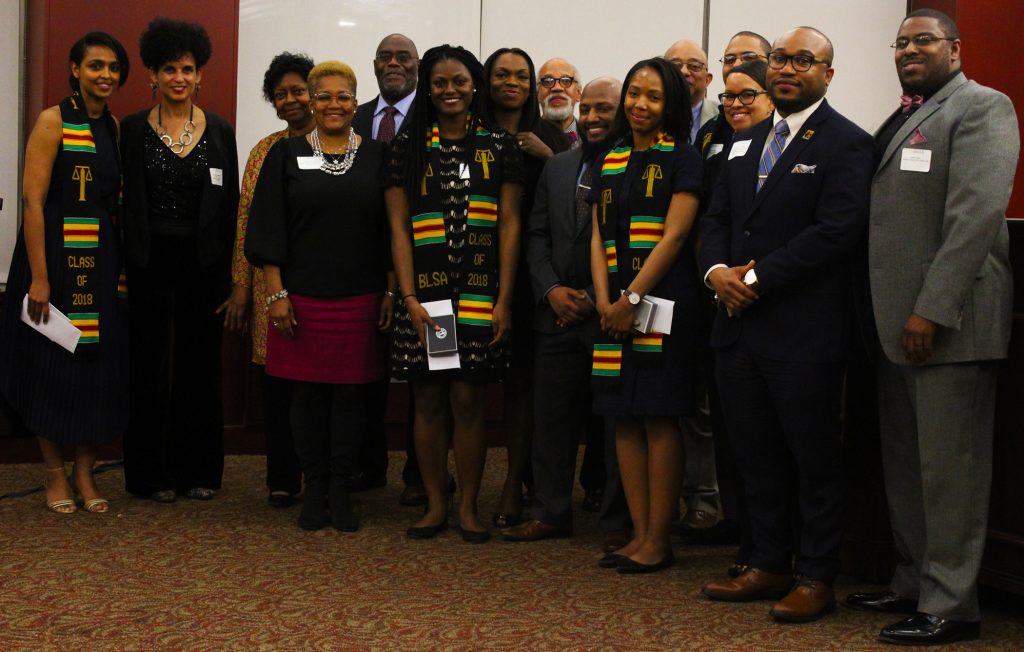Boston College Law School’s Black Law Students Association (BLSA) hosted its annual conference, themed “Project Liberation: Restoring and Protecting Our Communities,” at BC Law on April 14. The event brought students, faculty, alumni, legal scholars, and community leaders together for panel discussions focused on community policing, gentrification in urban neighborhoods, and fighting for social justice from the private sector. An awards banquet followed.
The first panel, “Community Policing: Law Enforcement, Urban Neighborhoods, and the Ties that Bind Us All,” featured Susan Maze-Rothstein ’85, a professor at Northeastern Law; Jay Carney ’78, a former public defender; Rachael Rollins, a candidate for Suffolk County District Attorney; and Boston Police Commissioner William Evans. The panelists discussed systematic racial disparities in the criminal justice system, and highlighted solutions prosecutors and police officers are exploring. Rollins and Evans spoke on the need to change cultures in the DA’s Office and on the police force, and advocated shifting success metrics and paradigms to focus on engagement and justice, rather than convictions. “We need more people in the room with different perspectives,” Rollins said. “That’s how things get better.”
The second panel, “Reclaiming Our Space: Gentrification and Displacement in Boston,” featured Lauren Song, senior housing attorney at Greater Boston Legal Services, and Tanisha Sullivan ’02, president of the NAACP Boston Branch. Song and Sullivan talked about a myriad of forces leading to gentrification and displacement in Boston, including new companies moving into the city, academic institutions expanding, and a housing shortage that current policy is failing to adequately address. “Development means displacement,” Song said, “but we actively anticipate and mitigate this displacement.”
“Communities need to come together and mobilize,” Sullivan added, “and in order to do that, communities need to know they have support. Find an organization where you can volunteer and get involved.”
The final panel, “Serving Your Community from the Private Sector,” featured David Rollins-Boyd ’14, senior associate at WilmerHale; Nigel Long, corporate counsel at Liberty Mutual; Carla Reeves ’10, associate at Goulston & Storrs; Allyson Wilkinson ‘16, associate at Mintz Levin; and Alvin Reynolds ’15, associate at Ropes & Gray. After discussing their firms’ pro bono programs and requirements, the panelists offered advice on balancing the desire to serve the public with more traditional corporate and transactional work. “The conflict is always there, internally,” Reynolds said, “buy you need to develop a reputation as a good, skilled attorney, and then you’re more useful [on public service work].”
“You might have to start by doing pro bono work after hours or on weekends,” Long added, “but once you work your way up, you can broaden out to work on things that mean something to you.”
Rollins-Boyd highlighted the importance of finding pro bono opportunities in underrepresented communities. “The exposure we’re giving in communities of color is impactful, because people who don’t see lawyers that look like them don’t know that it’s an option or a possibility,” he said.
The conference was followed by the Ruth-Arlene W. Howe Heritage Banquet. This year’s honorees were: Taisha Sturdivant ’16 (Young Alumni Award), Professor Ingrid Hillinger (Faculty of the Year Award), the BC Law Career Services Office (Outstanding Staff Award), and Pratt Wiley ’06 (Trailblazer Award).


